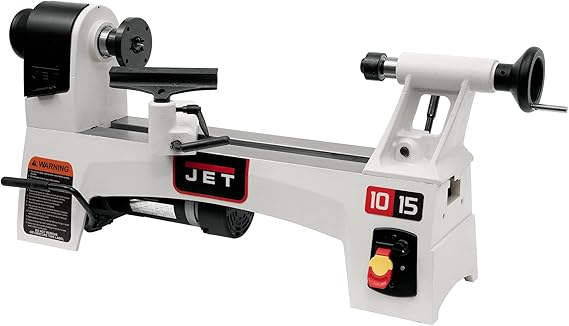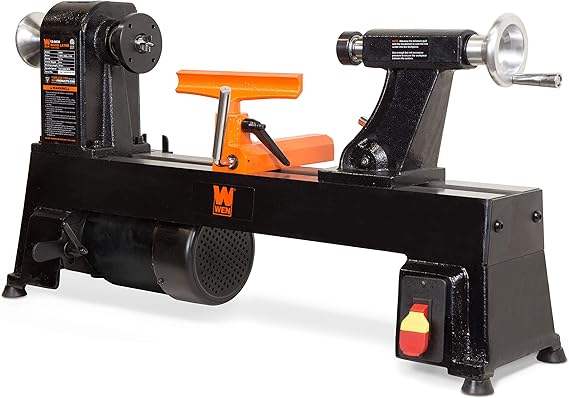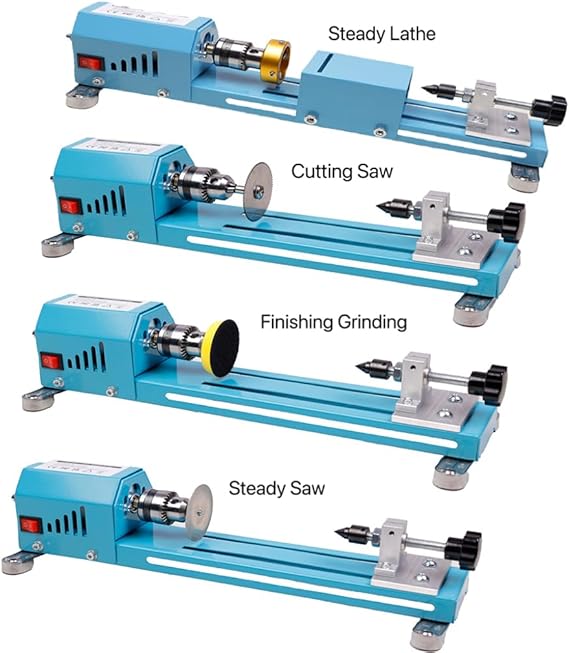Are Lathes Loud? Everything You Need to Know [2026 Guide]
Are you worried that the constant roar of your workshop machinery might be permanently damaging your hearing?
Operating a high-speed lathe creates significant vibrations and mechanical friction that generate intense, high-frequency sound waves. If you ignore these rising decibel levels, you risk developing chronic tinnitus or even long-term hearing loss. Fortunately, understanding lathe acoustics and implementing modern dampening techniques can transform your workspace into a much quieter environment.
This guide provides the essential technical solutions and safety protocols needed to protect your ears effectively today.
Understanding Decibel Levels in Modern Lathes
When evaluating workshop safety, we must measure the specific intensity of the sound produced by equipment. Most standard wood lathes operate between 70 and 85 decibels while running without any load applied. However, once the cutting tool engages with the workpiece, the noise level often spikes significantly higher. Metal lathes can reach even higher levels due to the density of the material being shaped. Harder woods or uneven workpieces create more vibration, which naturally increases the overall volume of the machine. Frequent exposure to sounds above 85 decibels requires consistent use of high-quality hearing protection devices.
Get to Know Which Metal Mini Lathes Will Dominate the Market in 2025 in our latest post!
How Loud Are Lathes?
| Source Type | Typical Noise Level | Comparison |
| Normal conversation | ~60 dB | Quiet background noise |
| Small wood lathe | ~60–70 dB | Comparable to a dishwasher |
| Metal lathe under load | ~80–90 dB | Similar to a lawnmower |
| Heavy CNC lathe | 85+ dB | Requires hearing protection |
Why Some Lathes Sound Louder (Key Noise Factors)
1. Machine Type
Wood Lathes usually operate quieter because wood is softer to cut. Metal Lathes are louder due to harder materials and more powerful motors.
2. Speed and Material
Faster speeds and tougher metals create more vibration and noise. Slowing RPMs and choosing the right cutting tools lowers loudness.
3. Maintenance and Build Quality
Loose belts, worn bearings, and aging machines make extra noise. Regular maintenance improves sound performance and extends lathe life.
4. Setup and Support
A lathe bolted to a solid bench with vibration pads produces less sound. Poor support amplifies noise and vibration.
Comparisons: Lathe Noise vs Other Shop Tools
| Tool | Typical dB Range | Noise Level Notes |
| Lathe (wood) | 60–70 dB | Quieter than most power tools |
| Lathe (metal) | 80–90 dB | Comparable to machinery |
| Table Saw | 90–110 dB | Louder and harsher |
| Router | 85–100 dB | Requires hearing protection |
How to Reduce Lathe Noise in Your Shop
1. Routine Maintenance
Lubricate bearings, tighten loose parts, and replace worn belts. This reduces friction and vibration, lowering sound output.
2. Noise Absorption
Install sound-absorbing panels or curtains around the lathe. These materials help trap and absorb noise waves, reducing the sound that escapes into your shop.
3. Isolation Pads
Place rubber or anti-vibration pads under your lathe to dampen vibration transmission into the floor.
4. Hearing Protection
If you’re running a lathe over 85 dB, OSHA recommends hearing protection like earmuffs or plugs. This is especially important for new CNC or metal lathes.
Lathe Noise Myths vs Reality
Myth: Bigger = always louder.
Reality: A well-maintained, balanced lathe can be quieter than a small neglected one.
Myth: All lathes are deafening.
Reality: Most hobby lathes operate at mellow noise levels below 80 dB.
Myth: You don’t need hearing protection for lathes.
Reality: Any long session above ~85 dB warrants hearing protection.
Top 3 Lathes You’ll Love From Amazon [Top Picks for 2026]
We’ve handpicked three of the most popular lathes on Amazon that users are raving about.
Jet JWL-1015VS 10-Inch by 15-Inch Variable Speed Lathe
This compact powerhouse is ideal for beginners and small workshops. With variable speed control, smooth operation, and a trusted Jet brand name, it’s perfect for woodturners who want precision without the bulk.

WEN LA3424 4.5-Amp 12-Inch Benchtop Lathe
Affordable yet packed with features, this WEN lathe is a fan favorite for hobbyists. It offers excellent stability, adjustable speeds, and is backed by WEN’s reliable support. A great choice for turning small- to medium-sized projects.

Onetuon Multi-Purpose Mini Lathe Accessories Kit
If you’re looking for a mini lathe setup or want to expand your toolkit, this multi-purpose accessories set is a must-have. Perfect for polishing, grinding, and precision tasks , it upgrades your DIY projects instantly.

How to Reduce Lathe Noise in Your Workshop?
Here’s how you can minimize lathe noise for a quieter (and safer) work environment:
| Noise Source | Quick Fix |
| Machine vibration | Add rubber pads or anti-vibration mounts |
| Cutting noise | Use sharp tools and proper feed rates |
| Resonating surfaces | Place lathe on solid, heavy workbench |
| Motor hum | Check for loose parts, oil bearings |
| Room echo | Add soundproofing or insulation panels |
Discover why metalwork lathes are a smart 2025 investment?
FAQs
Q: Are mini lathes quieter than full-size lathes?
A: Generally yes. Mini lathes have smaller motors and produce less cutting noise, but vibrations can still make them surprisingly loud in small spaces.
Q: Is a metal lathe louder than a wood lathe?
A: Yes. Cutting metal generates more noise and vibration compared to softer wood. Hearing protection is more often recommended for metal lathe users.
Q: Can I soundproof my workshop to reduce lathe noise?
A: Yes! Adding acoustic panels, sealing gaps, and isolating your lathe with rubber pads can all help reduce noise both inside and outside the workshop.
Conclusion
So, are lathes loud enough to warrant your serious attention and the use of protective safety equipment? The answer is a definitive yes, especially when you are working with hard materials at high speeds. By understanding decibel levels and maintaining your equipment properly, you can enjoy woodturning without sacrificing your long-term hearing. Remember that consistent hearing protection is the most important tool in your workshop for a long and healthy career.


